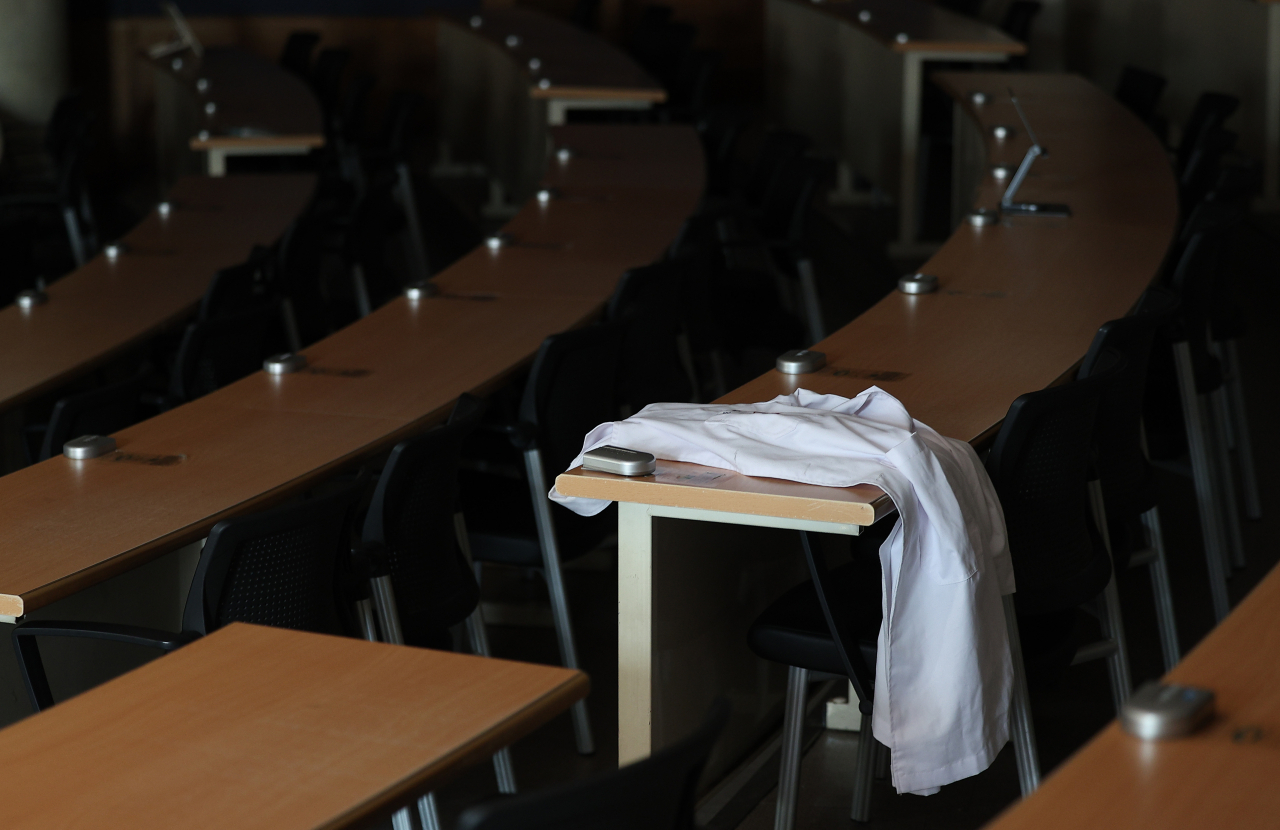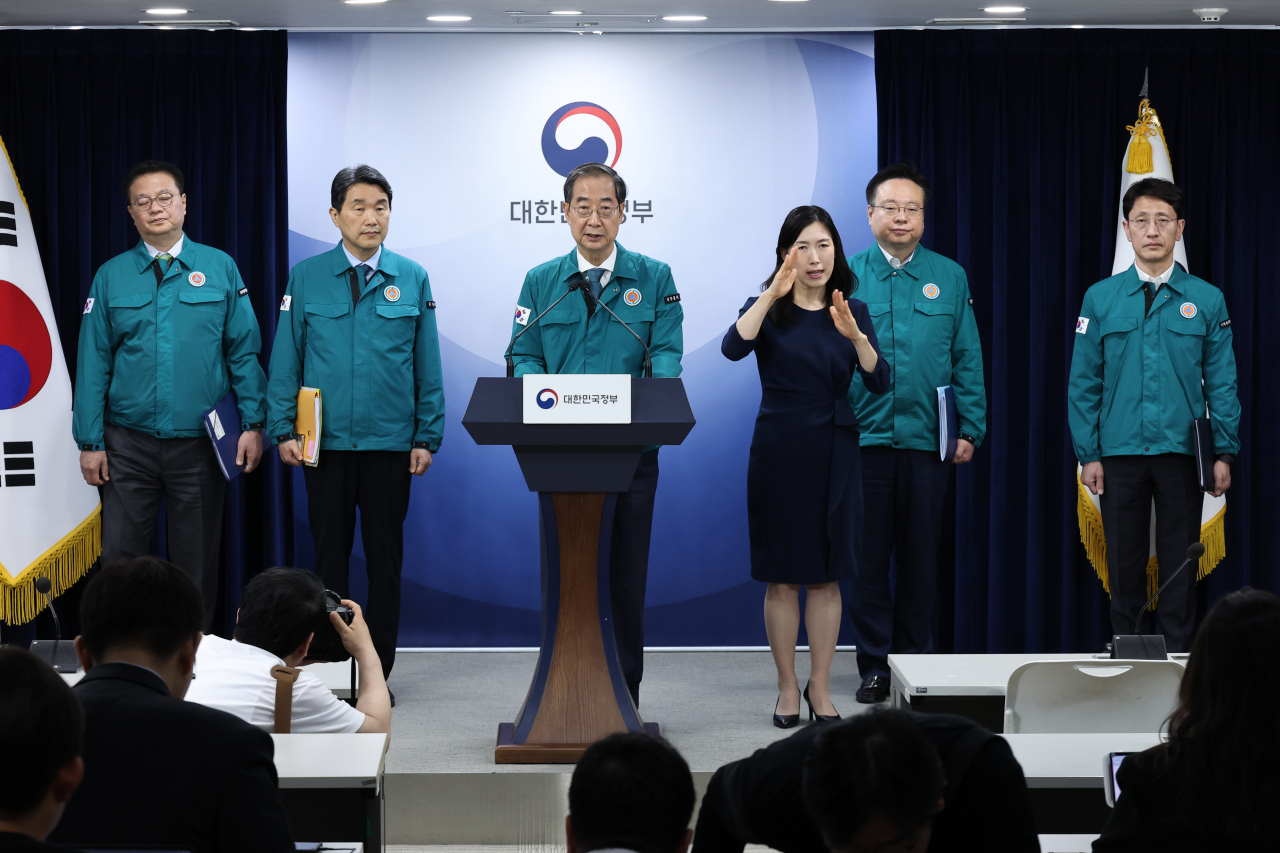 |
A white gown is laid in an empty classroom at Kyungpook National University (Yonhap) |
Taking a step back from pushing its medical reform plan, the Korean government said on Friday that it would allow medical schools with additional spots to adjust the number of new medical students freely in an attempt to break the standoff with the medical circle.
Prime Minister Han Duck-soo said during Friday’s press briefing that 32 colleges subject to the increase will be allowed to freely adjust the number of new medical students within a 50 to 100 percent range of the enrollment quota given to them for the 2025 academic year.
Han added that each medical school should make changes to its admissions quota by the end of April, given that the college admissions process for the 2025 academic year is approaching.
“As a government with responsibility, (we) hope that the decision made today could be an opportunity to resolve the (ongoing) issue. Please understand that the decision was made to protect the lives and health of our citizens,” Han explained, noting the damage caused by the medical void and the demands of the public to reach a solution.
Education Minister Lee Ju-ho also said during the same briefing that the government decided to bite the bullet to tame the admissions anxiety among parents and students with the admissions process nearing.
Asked when further changes could be made to the expansion plan, Lee said "we are open to engaging in dialogue,” echoing President Yoon Suk Yeol’s call on the medical field to come up with a single, unified proposal based on scientific and rational grounds.
Earlier in the day, a senior presidential official signaled a softening of its stance on its plan to add 2,000 more places at medical schools starting next year in a phone call with Yonhap News Agency, expressing hopes that there should be “room to consider the expansion plan positively.”
In line with the adjustment, the remaining 26 medical schools that also got additional seats will likely follow suit, according to observers, citing the medical community’s repeated requests to go back to square one. The number of new places could fall to as low as 1,000, they added.
 |
Prime Minister Han Duck-soo (center) gives a special briefing at the government complex in Seoul on Friday, announcing the government's decision to accept a suggestion from the heads of six national universities to scale back the expansion of medical student enrollment. (Yonhap) |
The announcement on the planned quota hike comes a day after six presidents of universities located outside of the capital area on Thursday afternoon released a joint statement urging the government to let each school freely adjust the enrollment quota for next year.
The six colleges are Gangwon National University, Kyungpook National University, Gyeongsang National University, Chungnam National University, Chungbuk National University and Jeju National University. All of them were allocated additional seats as part of the government’s effort to bridge the gap in medical service quality between the capital and rural regions.
“(We ask) the government to take full responsibility to ensure medical students return to classrooms, guarantee their right to education, as well as protect students so that conflict will not intensify further in the educational field,” the statement read.
Apart from pleading to reduce the medical school enrollment quota, the university chiefs also sought the government’s financial support to advance quality education so that the quality of medical education wouldn’t deteriorate after more medical students are admitted.
The medical community, however, remained lukewarm on the announcement.
Medical professors at Chungbuk National University questioned the government’s sudden shift in attitude. They said it remains unclear whether the decision was made to appease professors opposing the plan or to show that the government has done its best.
In another statement released Friday, Lee Byeong-cheol, the legal representative of medical professors and students, said that the remaining 34 university presidents would also “be up in arms against the government,” hinting that they, too, may also take action to lower the quota hike.
Junior doctors who have entered their ninth week of walkouts likened the government's lowering of its planned medical school enrollment hike to "an attempt to find an emergency exit," adding that the change will do little to bring them back.
Joo Soo-ho, former head of the Korean Medical Association’s emergency committee’s public relations council, wrote on his Facebook page Friday that the decision to have more medical students should be reviewed from the beginning.
Meanwhile, a special commission on medical reform consisting of around 20 people, including medical experts, patients and other members of society, will be launched next week and hold its first meeting.







